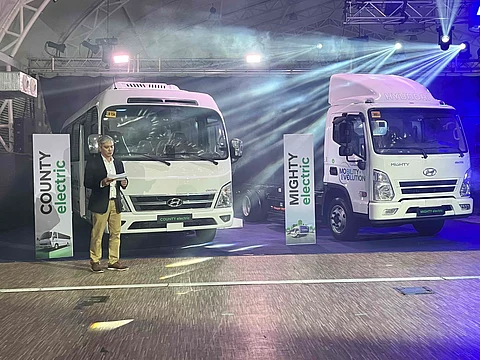
- NEWS
- the EDIT
- COMMENTARY
- BUSINESS
- LIFE
- SHOW
- ACTION
- GLOBAL GOALS
- SNAPS
- DYARYO TIRADA
- MORE

The Department of Transportation (DoTr) maintained that the government is on track for a modernized and carbon-free public transportation system amid the ongoing backlash and clamor for extension from transport groups.
“Under the Public Utility Vehicle (PUV) Modernization Program, our direction is clear: We are transitioning towards a low-emission, safe, efficient, and people-centric public transportation system. The Department of Transportation is actively advancing several initiatives to make this vision a reality, especially to scale up electric PUV development nationwide,” according to the message of Transportation Secretary Vince Dizon, relayed by Reymundo de Guzman Jr. from the Office of Transportation Cooperatives, during the Hyundai Truck and Bus Mobility Expo 2025 in Filinvest City, Alabang on Friday.
Dizon said one of the developments for the PUVMP includes the completion of public transport route plans by means of fast-tracking support to local government units to realize and update their route plans.
“Without coherent and responsive route networks, we cannot ensure the viability of modern and electric vehicle units. We are determined to finalize the route plans across all regions this year,” Dizon said.
Also, the Transport chief said they continue to accelerate the accreditation of modern electric PUV models, which are high-quality and cost-effective for the market.
“The DoTr, Land Transportation Office, and the Land Transportation Franchising and Regulatory Board are currently refining the process for fast approval of PUV models,” he said.
Also, Dizon said the DoTr is pushing for stronger subsidy support for PUV operators to ease the transition to modern transportation, as well as their support to the Department of Trade and Industry’s Board of Investments in offering incentives to local and foreign manufacturers of electric vehicles.
Last year, the BoI, which is the lead agency implementing the Electric Vehicle Incentive Strategy (EVIS), set a goal of producing 6.3 million electric vehicles (EVs) by 2040 under the clean energy scenario (CES) or 1.7 million units under a business-as-usual (BAU) scenario.
The BoI said it is finalizing the Electric Vehicle Incentive Strategy (EVIS) that will be submitted to the Fiscal Incentive Review Board (FIRB) for approval.
The BoI said EVIS would offer incentives to manufacturers who meet specific performance parameters, such as local content requirements and the localization of critical technologies like batteries and software development systems.
At the said expo, Hariphil Asia Resources Inc. (HARI), the official distributor of Hyundai Trucks and Buses in the Philippines, launched the Hyundai Mighty Electric, a light-duty electric truck powered by a 120-kW permanent magnet synchronous motor, producing 163 ps and 32.6 kg-m of torque.
With a 114.5 kWh lithium-ion battery, the Mighty EV offers an all-electric range of 260 km.
Charging is efficient, with a 100 kW DC charger providing a full charge in just 71 minutes. The Mighty Electric offers businesses multiple applications, and dealerships can coordinate with HARI’s partner builder, Centro Manufacturing Corporation, to customize the Mighty Electric to their specific business requirements.
Meanwhile, the Hyundai County Electric redefines people movers with its 150-kW (204 ps) motor, delivering 40.3 kg-m of torque and a range of 303 kilometers per full charge.
Equipped with a 128-kWh lithium-ion battery and a rapid 72-minute charging time, the Hyundai County Electric signifies the future of transportation that is clean, quiet, and comfortable.
Also launched was the HARI Cab, a locally assembled internal combustion engine (ICE) workhorse tailored for Filipino communities. Powered by a Euro 4 D4CC diesel engine, it offers 160 ps at 3,000 rpm and a maximum torque of 40 kg-m at 1,250 to 2,800 rpm. With a 2,891-cc displacement and a 100-liter fuel tank, the vehicle delivers best-in-class performance while supporting local jobs and transport efficiency for both urban and rural areas.
HARI Vice Chairman, President, and CEO Ms. Maria Fe Perez-Agudo highlighted HARI’s bold bid to transform and position itself as a key player in driving smart businesses through smart mobility.
“We are here not just to see what’s new, but to shape what comes next, harnessing our drive, ingenuity, and ambition to push the boundaries of mobility and business,” she affirmed.
